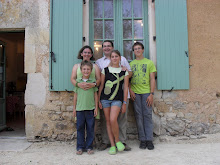In January 2002 it was Marc’s 5th birthday, and he wanted to invite all his friends. Jacques said that in France you would just invite a few kids round for a tea or gouter, but in England kids birthday parties are important events. Not wanting him to feel left out we hired a sports hall and invited all the class. They jumped on the bouncy castle, ran around madly and then wolfed down chicken nuggets and chips with ice cream in the cafe. The birthday cake was brought in, we all sang ‘Happy Birthday’ and Marc blew the candles out, but we did not eat the cake. The kids lined up for their ‘party bag’ gift, and a slice of the cake wrapped in a paper napkin to take home with them. Before they all left Jacques insisted that Marc open his gifts in front of his friends, something not always done at English parties. Marc did so with a genuine happiness to receive each present, and thanked each child properly. But I still had to send out personalized thank-you cards a few days later anyway as one does in England….
I was into a good work rhythm researching and writing my book on one-parent-one language families. I had the luxury of my evening classes on Linguistics and the Birkbeck Library in London to escape to (on the two days I had my babysitter) and the book was progressing nicely. Once or twice a month I would take a work-break and do some volunteering. Nina’s pre-school invited one mother to help out every day once a term. I liked this system, it seemed fair and the teachers were friendly and chatty. At the Wednesday church playgroup I attended with Nina I did my craft rota or helped tidy away the toys. In Marc’s school I did some reading practice, school trips and for big fundraisers, like summer fetes, I would man a stall or help do face-painting. But no matter how much I tried I was never really accepted in the various communities.
People would ask me where I had lived before and I would vaguely say ‘France..’, to which they would either be stunned into silence or chat about their parents/brother/cousin who bought a cheap property in France and did it up…Other mothers would ask me about my unusual surname. It seemed that there was a big difference to 1995 when having a French boyfriend was rather sexy and clever. But seven years on as a French/English family people wondered how could I be married to a Frenchman? On top of that we were renting a small flat, when most families in that area owned their houses. We had a tiny 10-year-old Peugeot 206, which looked like a toy compared to most mother’s family cars. My close friends and family were able to look beyond the material possessions, of course, but in general I often felt excluded or somehow not English any more. But then again I didn’t feel 100% English either, and often felt I was looking at my own country with the eyes of a foreigner. No wonder the other mothers didn’t know how to place me.
My saviour was Helen, who I met while researching the OPOL book. Helen was a mix of English and Norwegian parentage and married to a Frenchman. They had lived in London a few years and before that in Switzerland, like us. Our children were of a similar age and at last I was able to talk to someone who truly understood the reality of being married to a Frenchman, but living in England. Helen spoke excellent French and loved France and her family, which she often visited. Both our husbands liked working in England and enjoyed English comedies and cinema. Over lunch we would discuss the problems of choosing schools, helping your children to fit in and keeping languages strong and alive. When we got together the kids would speak mostly English together, but we would hear French mixed into sentences.
Helen and I were both struggling to keep the French alive in a very monolingual environment. Our children were too young to study French at school (which would have been for beginners anyway) so the French mainly came from Papa. But living and working in England had made English the dominant language. So dominant that when I calculated how much French my kids spoke these days it was only about 20%. My research on Language Shift, and the inevitable Language Death which follows if no action is taken alarmed me. At home books, television, videos, games were in the majority in English. And then one day, with amazement, I listened to Jacques asking Nina a question in French and she replied in English. He accepted it and they continued what they were doing as if nothing strange had happened…..
Subscribe to:
Post Comments (Atom)



No comments:
Post a Comment